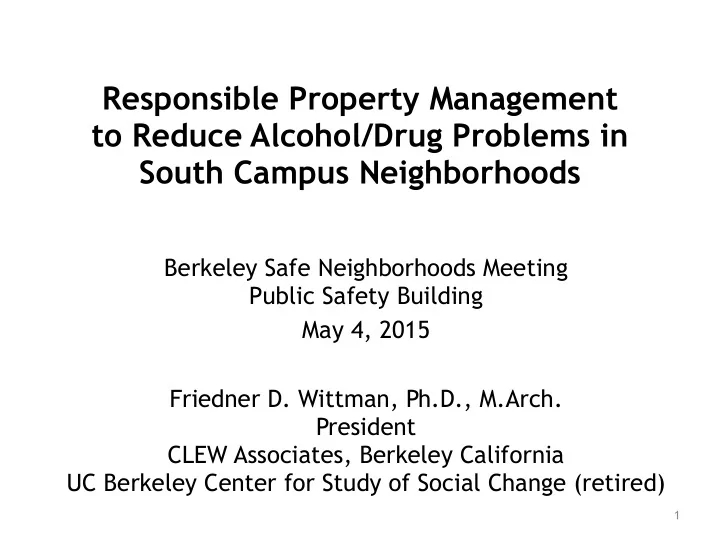

Responsible Property Management to Reduce Alcohol/Drug Problems in South Campus Neighborhoods Berkeley Safe Neighborhoods Meeting Public Safety Building May 4, 2015 Friedner D. Wittman, Ph.D., M.Arch. President CLEW Associates, Berkeley California UC Berkeley Center for Study of Social Change (retired) 1
Private Off-Campus Residences are Major Sites for Alcohol Problems Many college students encounter negative personal, social and health experiences. • Unwanted / forced sex. • Violence • Injury and disease requiring treatment • Loss of personal property/property damage • Personal criticism • Harm to academic career and to future profession These harms are afloat on a sea of alcohol 2
Number of Times Students <21 got drunk at off-campus parties during last semester N = 233 (PRC survey in 2006) Number of times student who N (percent) attended parties got drunk 15+ times 26 (11.2) 10-14 times 15 (6.4) 5-9 times 41 (17.6) 1-4 times 71 (30.5) 0 times 80 (34.3) 3
Private Off-Campus Residences are Major Sites for Alcohol Problems Where does this problem-drinking occur? Where opportunities abound and consequences are minimal: On-site alcohol management is most lax at off-campus housing. • On-campus housing operates under UC control. • Bars and Restaurants operate under City supervision. • Public Places and Public Events are under City control • Private off-campus housing operates under owner/manager control, often delegated to property management (PM) firms. • Fraternities are private off-campus housing. 4
UCSB student visits to settings where alcohol served ( by percent, 2003-2007 ) 100 80 60 40 2003 20 2004 0 2005 On-Camp Res. Off-Campus Res. Restaurant/Bar Frat/Sorority Outdoor Event Sporting Event 2006 2007 Community Prevention Planning Program, ISSC, UC Berkeley 5
Alcohol Management at Off-Campus Housing is an Overlooked Prevention Resource Property managers (PMs) represent owner/managers… • Some do a good job with alcohol mgmt & have few problems. • Many have problems & would like to do a better job. • A few have problems & don’t mind (the “10-50” exploiters). Very little is being done to “mine” this resource • Find out what works and share it among local PMs. • Engage PMs with University and City support. • Create positive community norms for alcohol mgmt that combine commercial success with temperance. 6
Recommended Site-level Alcohol Management Policy at Off-Campus Residences • Lease language limits social activities (noise, overcrowding, respond to neighbor complaints, lessee responsible for all uses of unit) & sanctions their violation. • Lease language restricts alcohol in common areas and outdoors (or allows only by permit with security). • Personal orientation for each new lessee. • Regular visits by PM to inspect property and greet residents. • On-site resident monitor maintains fidelity to policy and reports regularly to PM office. 7
Community Support for Alcohol Management Policy at Off-Campus Residences - I Property Manager Community • Form core-group of PMs dedicated to effective mgmt policy. • Create RPM Safe & Civil Housing marketing group. • Participate in community prevention planning coalition. Police department • Make incident reporting system accessible to PMs for checks on events at/near residence; follow up w/ PM promptly. • Participate in Responsible Property Managers Working Group. • Report persons named in police events to UC Student Affairs. 8
Community Support for Alcohol Management Policy at Off-Campus Residences - II University • Support Safe & Civil Housing group at UC Housing Office. • Hold Student Life discussions on off-campus housing issues. • Engage parents and participate in documentation/research City, Neighbors, and Tenants • Convene regular community meetings on safe & civil housing. • Provide police data in community-friendly format (ASIPS). • Create city inter-departmental alcohol policy working group. • Create programs and policies for the “10-50” problem-PMs. 9
Recommend
More recommend